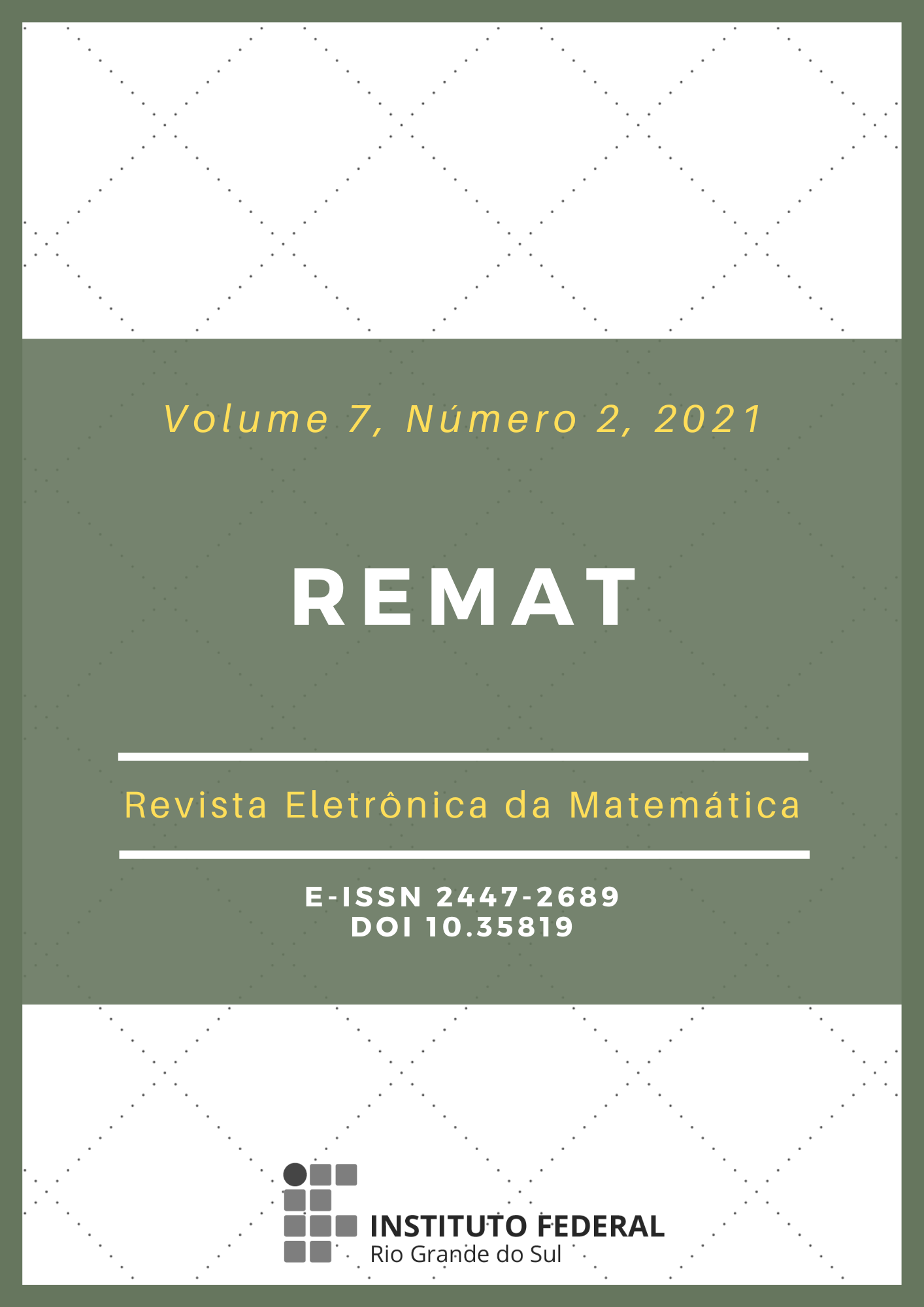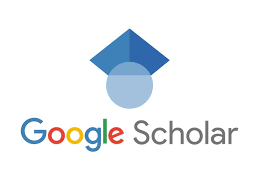In times of remote teaching: practicing Mathematics on Google Forms from an epidemiological bulletin on Coronavirus-Covid-19
DOI:
https://doi.org/10.35819/remat2021v7i2id4856Keywords:
Mathematics, Problem Solving, Covid-19, Google FormsAbstract
This work aims to make considerations about the development of a remote mathematics activity with the students of the 6th year of the School Claudionora Nobre de Melo, located in the city Caravelas. The conduction of this pedagogical practice started with an epidemiological bulletin on the Coronavirus-Covid-19 found in this location, in the extreme south of Bahia. Such a study is justified by the fact that it is a strategy that enables dialogue between two aspects: the current pandemic moment and mathematical knowledge, thus favoring the learning of mathematical contents. In this perspective, it makes use of the problem-solving methodology based on mathematical situations and based on Paulo Freire's reflections, which proposes the improvement of the contact with Mathematics, creating conditions for this knowledge to be built. With this direction, it also relies on the BNCC, which portrays this methodological aspect as a privileged instrument in the teaching and learning process of elementary education. To do so, it uses the Google Forms as a pedagogical and technological resource, subsidizing the present study and as a way of arousing the student's interest. Everything indicates that promoting actions of an interdisciplinary nature diversifies, dynamizes, and enriches the binomial teaching and learning of Mathematics, which in a way also establishes relationships between the mathematical object and real events linked to the students' experiences, such as social issues, focused on the health area. These are viable and significant contexts for the construction of mathematical exercises.
Downloads
References
BRASIL. A área de Matemática. In: Base Nacional Comum Curricular. Brasília: MEC, 2018. p. 265-320. Disponível em: http://basenacionalcomum.mec.gov.br/images/BNCC_EI_EF_110518_versaofinal_site.pdf. Acesso em: jan. 2021.
CAETANO, Marcos Antônio Guedes. Dando vez e voz aos alunos da EJA: promovendo um fazer matemático dinâmico. Cidadania em Ação: Revista de Extensão e Cultura, Florianópolis, SC, v. 4, n. 2, jul./dez. 2020a. DOI: https://doi.org/10.5965/259464124227.
CAETANO, Marcos Antônio Guedes. A Matemática a partir de um boletim epidemiológico (Coronavírus-Covid-19). 2020b. Disponível em: https://forms.gle/5DEiQpxwyLbmi8Yh7. Acesso em: jan. 2021.
CARAVELAS. Boletim Epidemiológico Coronavírus/Covid-19. Prefeitura Municipal de Caravelas. 11 ago. 2020. Disponível em: https://www.caravelas.ba.gov.br/coronavirus/. Acesso em: jan. 2021.
D’AMBRÓSIO, Ubiratan. Educação Matemática: da teoria à prática. Coleção Perspectiva em Educação Matemática. Campinas, SP: Papirus, 1996.
DANTE, Luiz Roberto. Formulação e resolução de problemas de Matemática: teoria e prática. 1. ed. São Paulo: Ática, 2010.
DANTE, Luiz Roberto. Tudo é Matemática. 2. ed. São Paulo: Ática, 2005.
FREIRE, Paulo. Pedagogia da autonomia: saberes necessários à prática educativa. 12. ed. São Paulo: Paz e Terra, 1996a.
FREIRE, Paulo. Congresso de Educação Matemática. [Entrevista cedida a Ubiratan D’Ambrósio e Maria do Carmo Domite Mendonça]. 1996b. Disponível em:
https://www.youtube.com/watch?v=tKkkGY1co7s&t=226s. Acesso em: jan. 2021.
FREIRE, Paulo. Pedagogia do oprimido. 17. ed. Rio de Janeiro: Paz e Terra, 1987. Disponível em: https://cpers.com.br/wp-content/uploads/2019/10/Pedagogia-do-Oprimido-Paulo-Freire.pdf. Acesso em: jan. 2021.
GROENWALD, Claudia Lisete Oliveira; SILVA, Carmen Kaiber da; MORA, Castor David. Perspectivas em Educação Matemática. Acta Scientiae, Canoas, RS, v. 6, n. 1, p. 37-55, jan./jun. 2004. Disponível em: http://www.periodicos.ulbra.br/index.php/acta/article/view/129. Acesso em: set. 2020.
ONUCHIC, Lourdes de la Rosa. A resolução de problemas na Educação Matemática: onde estamos e para onde iremos? In: JORNADA NACIONAL DE EDUCAÇÃO MATEMÁTICA, 4., JORNADA REGIONAL DE EDUCAÇÃO MATEMÁTICA, 17., 2012, Passo Fundo. Anais [...]. Passo Fundo: Universidade de Passo Fundo, 2012. p. 1-15. Disponível em: http://anaisjem.upf.br/download/cmp-14-onuchic.pdf. Acesso em: ago. 2020.
POLYA, G. A arte de resolver problemas: um novo aspecto do método matemático. Tradução e adaptação: Heitor Lisboa de Araújo. Rio de Janeiro: Interciência, 1995. Disponível em: http://im.ufrj.br/~nedir/disciplinas-Pagina/Polya-Arte_Resolver_Problemas.pdf. Acesso em: jan. 2021.
SANTOS, Victor. Ensino remoto: como potencializar suas aulas com o Google Forms. Nova Escola, São Paulo, SP, 13 jul. 2020. Disponível em: https://novaescola.org.br/conteudo/19492/ensino-remoto-como-potencializar-suas-aulas-com-o-google-forms. Acesso em: jan. 2021.
SERRAZINA, Maria de Lurdes; RIBEIRO, Deolinda. As Interações na Atividade de Resolução de Problemas e o Desenvolvimento da Capacidade de Comunicar no Ensino Básico. Bolema, Rio Claro, SP, v. 26, n. 44, p. 1367-1393, dez. 2012. Disponível em: https://www.redalyc.org/pdf/2912/291226280012.pdf. Acesso em: set. 2020.
Downloads
Published
Issue
Section
License
Copyright (c) 2021 REMAT: Revista Eletrônica da Matemática

This work is licensed under a Creative Commons Attribution 4.0 International License.
REMAT retains the copyright of published articles, having the right to first publication of the work, mention of first publication in the journal in other published media and distribution of parts or of the work as a whole in order to promote the magazine.
This is an open access journal, which means that all content is available free of charge, at no cost to the user or his institution. Users are permitted to read, download, copy, distribute, print, search or link the full texts of the articles, or use them for any other legal purpose, without requesting prior permission from the magazine or the author. This statement is in accordance with the BOAI definition of open access.













 https://orcid.org/0000-0002-0893-7426
https://orcid.org/0000-0002-0893-7426


















